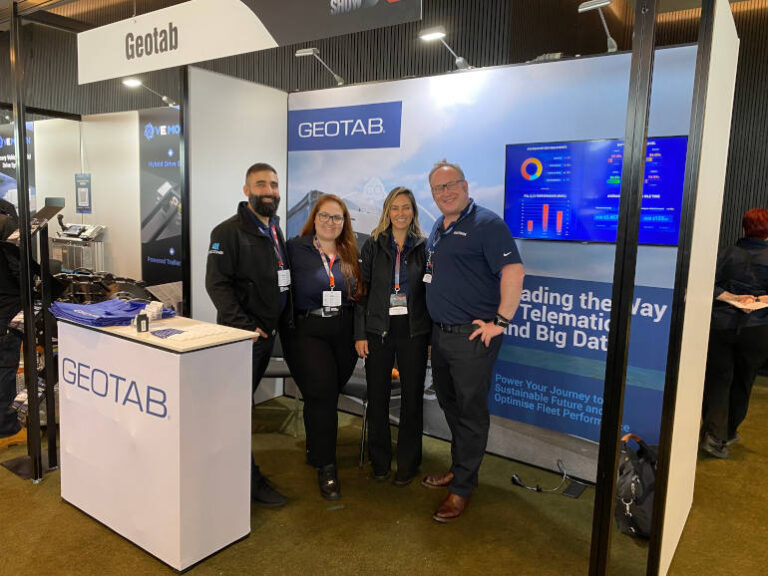The TruckShowX conference was a new event in the fleet management calendar in 2024. It offered industry leaders a platform to showcase innovations and discuss how to decarbonise the heavy vehicle sector. I caught up with David Brown from Geotab who brought invaluable insights to the table, highlighting the challenges and opportunities in fleet management, particularly during the transition low and zero emission road transport.
The importance of data-driven decision making
David Brown’s discussion underscored the pivotal role data plays in fleet management, especially as fleets transition to EVs. With the industry still in its infancy regarding this transition, many fleet managers find themselves navigating uncharted waters. “We’re at that stage where people are talking about transitioning from combustion to electric, but not many people have actually done it,” Brown pointed out. The decision on which vehicles to replace and which to retain is crucial, as it impacts operational efficiency and cost-effectiveness.
Geotab’s solution to this challenge is a unique report generated by their system, which advises fleet managers on which vehicles to swap out and which to bring in. This report is based on a minimum of three months of data collection, covering key metrics like kilometers traveled, idle times, and fuel consumption. This comprehensive analysis enables fleet managers to make informed decisions, minimizing the risk of operational losses. “It actually tells you which make and model is best suited to do the job,” Brown explained. This data-driven approach is a game-changer, providing fleet managers with the information they need to transition effectively without incurring unnecessary costs.
Simplifying the transition process
One of the key takeaways from the conversation with Brown was the emphasis on simplifying the transition process for fleet managers. The transition from combustion engines to EVs is not just about swapping vehicles; it’s about understanding the operational implications of such a change. Geotab’s tools are designed to make this process as seamless as possible. “It’s about making it easy to transition to Geotab but also making it easy to manage,” Brown said.
He highlighted the challenges fleet managers face, especially with compliance and the management of multiple hardware and software systems. In Australia, specific compliance requirements such as those set by the Transport Certification Australia (TCA) and the National Heavy Vehicle Regulator (NHVR) add layers of complexity. Geotab’s certification with TCA, along with its AI-driven solutions, aims to address these challenges by providing fleet managers with easy-to-use tools that simplify compliance management and operational oversight.
Geotab’s AI solutions: A leap forward
Brown also introduced Geotab’s latest AI solution, ACE, which has the potential to revolutionise fleet management. The ACE system uses natural language processing, similar to ChatGPT, allowing Fleet Managers to input simple queries and receive comprehensive reports. This tool eliminates the need for deep technical knowledge or a dedicated data scientist within the organisation. “You can say, ‘Hey, what are the five most underutilised vehicles in my fleet?’ and it’ll bring up that report very, very quickly,” Brown explained.
This AI-driven approach addresses one of the most significant challenges in telematics: the management of vast amounts of data. Traditionally, Fleet Managers had to sift through extensive data to derive actionable insights, a time-consuming and often overwhelming task. Geotab’s ACE simplifies this process, making it easier and faster to make informed decisions.
Learning from the market
TruckShowX was not just an opportunity for Geotab to showcase its innovations but also a chance to learn from the market. Brown emphasised the importance of understanding the specific needs of the Australian road transport market, which has unique compliance requirements and operational challenges compared to other regions. “We want to know what the industry is looking for and what we don’t have, what the product gaps are that people need,” Brown said.
Geotab’s approach to product development is heavily influenced by customer feedback and industry insights. By attending conferences like TruckShowX and engaging with Fleet Managers, OEMs, and industry associations, Geotab gains valuable insights that shape their product offerings. This customer-centric approach ensures that Geotab’s solutions not only meet compliance requirements but also address the real-world challenges that fleet managers face daily.
David Brown’s insights at TruckShowX highlighted the evolving landscape of fleet management and the critical role that data and AI will play in this transition. As the industry moves towards electric vehicles, tools like Geotab’s ACE and their comprehensive fleet reports will be indispensable for Fleet Managers looking to make informed, cost-effective decisions.
Geotab’s commitment to making the transition process easier, combined with their focus on understanding the specific needs of the Australian market, positions them as a leader in the fleet management space. As Brown concluded, “It’s about making it easy for a driver to get in the vehicle, switch it on, and just drive without thinking.” This vision of simplicity and efficiency is at the heart of Geotab’s mission, driving the future of fleet management in Australia and beyond.






